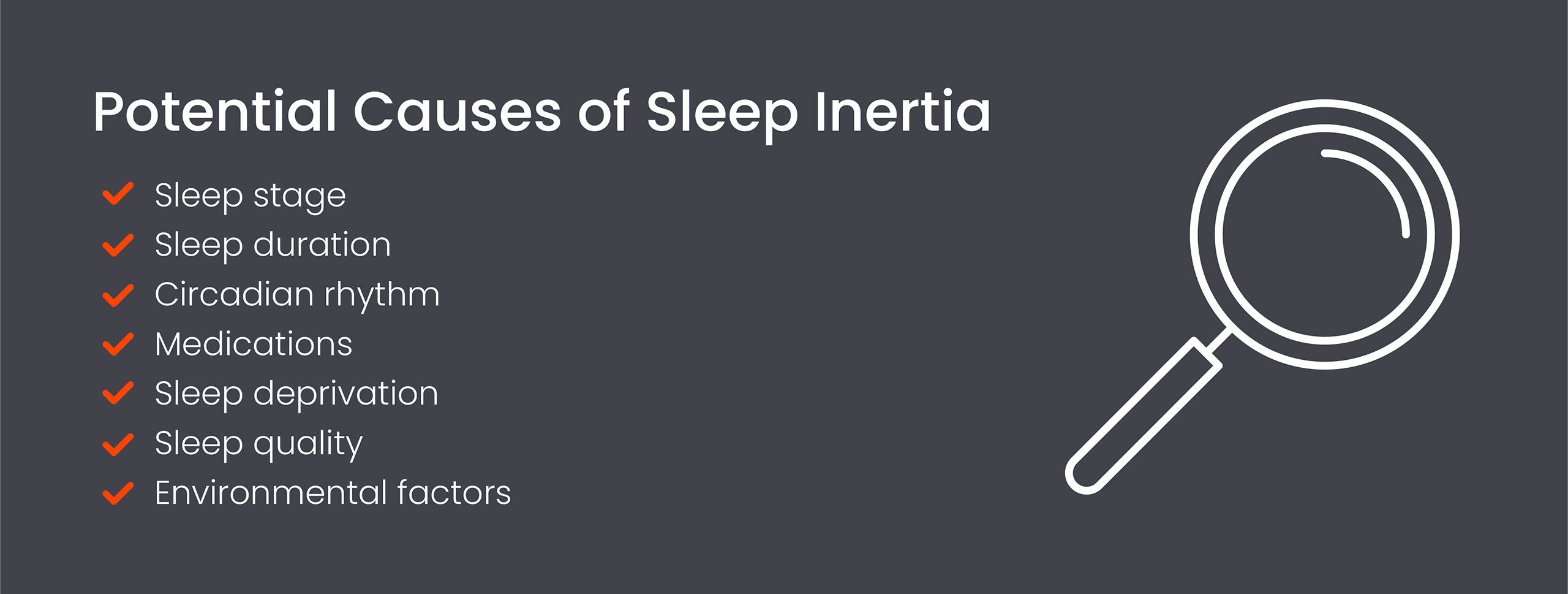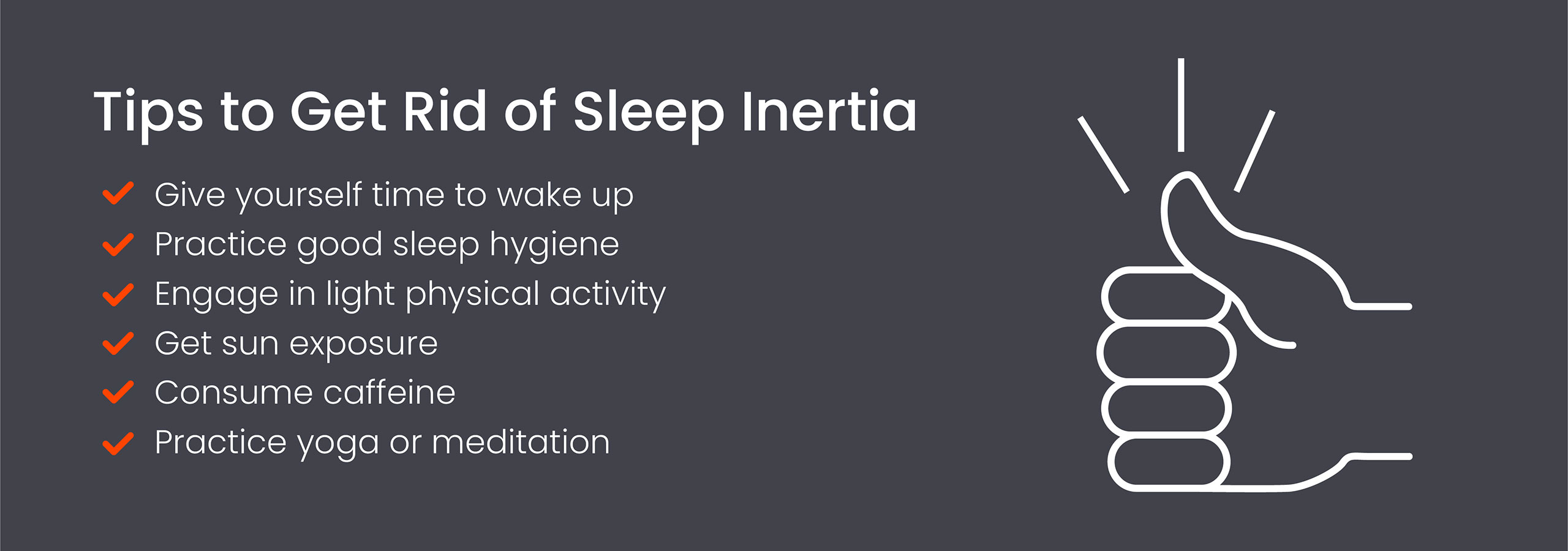Sleep Inertia: Causes, Symptoms & Treatment

Sleep inertia occurs after a long sleep and causes disorientation and a decrease in mood immediately after waking. Many people suffer from sleep inertia and have to take time to start feeling awake in the morning, usually having a cup of coffee to help while they prepare for the rest of their day.
There’s no denying the importance of sleep. Without quality sleep, you won’t feel or perform your best. But, when you don’t get enough quality sleep, you can suffer from sleep inertia, making it feel like you haven’t slept.
This article will discuss everything you need to know about sleep inertia, including why it happens and ways to combat feelings of grogginess after a night of sleep or a long nap. Let’s get started.
- What Is Sleep Inertia?
- What Causes Sleep Inertia?
- What Are the Symptoms of Sleep Inertia?
- How Long Does Sleep Inertia Last?
- How Do You Get Rid of Sleep Inertia?
- What Are Other Ways to Improve Sleep?
- Key Takeaways: How to Overcome Sleep Inertia
What Is Sleep Inertia?
Sleep inertia is the grogginess someone feels when they wake up. For some, it only lasts a few minutes, but for others, it can impact their entire morning, forcing them to wake up earlier just so they can try to make themselves feel awake.
Sleep inertia most commonly affects those without regular sleep schedules, such as night workers or individuals who don’t fall asleep or wake up at the same times every day. This is why it’s so common after you take a long nap; you’re off your normal sleep schedule, and it can take your brain time to catch up after waking.
Unfortunately, grogginess can affect how you perform and feel after waking up. Many people experience moodiness or crankiness, while others have difficulty managing simple tasks because they don’t feel fully awake yet.
Unfortunately, the exact cause of sleep inertia is unknown, but many theorize that it’s supposed to help the brain fall back asleep. Unfortunately, many of us can’t fall back asleep because we have to get to work in the morning or have other priorities, so sleep inertia can leave us feeling groggy, unproductive, and less alert.
What Causes Sleep Inertia?
Researchers don’t know the exact cause of sleep inertia, but several factors may contribute to it, such as:

- Sleep stage: Some researchers believe that sleep inertia may partly be caused by the non-rapid eye movement (NREM) sleep stage in which delta waves increase after periods of sleep loss. If the brain hasn’t reduced the delta waves to prepare for waking up or someone is woken suddenly, they may be more likely to experience sleep inertia.
- Sleep duration: How much sleep do you need? Not knowing could be the cause of your sleep inertia. Sleeping more or less than you’re used to can affect your sleep cycles, causing you to suffer from sleep inertia. For instance, if you nap for over half an hour, you may enter deep sleep. Then, when you wake up, your mind will have a more challenging time processing information. For most adults, it’s recommended to sleep between 7 and 9 hours each night.
- Circadian rhythm: Where your circadian rhythm is when you wake up can impact your likelihood of having sleep inertia. A sleep disorder affecting your circadian rhythm can cause sleep loss, worsening sleep inertia. Additionally, your sleep chronotype and when you sleep and wake can cause sleep inertia. For instance, if you feel more awake during the early morning hours, waking up from a nap at night may lead to grogginess.
- Medications: Medications can affect overall sleep quality, which can lead to you waking in the middle of the night and suffering from disrupted sleep cycles, leading to sleep inertia.
- Sleep deprivation: Losing sleep will always prevent you from feeling well-rested. If, for some reason, you wake up earlier than your body is used to, you may suffer from sleep inertia. After a night of sleep deprivation, your performance will be much worse when you wake up because you’re missing out on the necessary deep and restorative sleep cycles.
- Sleep quality: Waking up in the middle of the night may also cause sleep inertia because it means you’re likely waking during deep sleep. Deep sleep is the most challenging to wake up from because your body needs it to restore itself. If you wake up abruptly in the middle of the night, you may be waking up during that sleep stage. However, if you wake up in the middle of the night, it may also mean you’re not getting enough deep sleep, leading to sleep inertia.
- Environmental factors: Several sleep environment factors, such as temperature, light, and sound, can affect your ability to fall asleep and stay asleep at night. For instance, if your bedroom is too hot during the summer, it can cause you to wake up multiple times in the middle of the night, disrupting your sleep cycle and causing sleep inertia when you wake up in the morning.
What Are the Symptoms of Sleep Inertia?
There are several sleep inertia symptoms many of us feel when we take a long nap or wake up after a night of poor sleep. The most common sleep inertia symptom is waking up feeling like you’re not actually awake or alert yet. Let’s explore some common sleep inertia symptoms to help you determine if you’ve ever experienced it.

- Grogginess: Grogginess is the most common symptom of sleep inertia. When you’re groggy, you can’t think clearly, and it still feels like parts of your mind haven’t woken up yet. Many people feel groggy for at least a few minutes in the morning, but the symptom subsides once they start their day.
- Confusion: Sleep inertia can also lead to confusion. Many people experience confusion after a long nap or waking up after a night of poor sleep.
- Mood disturbances: Imagine the last time you were woken up abruptly. Most people don’t enjoy being woken up and suffer from mood disturbances due to confusion and grogginess. Feeling groggy while trying to think or focus can also lead to frustration.
- Headache: Headaches are another common sleep inertia symptom and are most common when you don’t get enough quality sleep.
- Impaired cognitive function: When you experience sleep inertia, your mind can’t function properly, leading to confusion and impaired cognitive function. If you begin trying to do something, like performing your morning ritual, you might be unable to think clearly.
How Long Does Sleep Inertia Last?

Sleep inertia typically lasts between 30 to 60 minutes. However, some people may experience it for up to two hours or more, or may experience excessive daytime sleepiness. For example, individuals with alternative sleep schedules may suffer from long periods of sleep inertia. Luckily, there are several ways to get rid of the symptoms of sleep inertia so you can get on with your day.
How Do You Get Rid of Sleep Inertia?
There’s no single sleep inertia cure. If you want to learn how to get rid of sleep inertia, you may have to experiment with different strategies. Many people experience periods of grogginess after first waking up, but you can reduce that grogginess by following these simple tips:

- Give yourself time to wake up: If you feel groggy when you wake up, give yourself time to allow your brain to reboot after sleeping. Most people can’t wake up and jump right out of bed as soon as their alarms go off. Instead, relax in bed for a few minutes before thinking about your day.
- Practice good sleep hygiene: One of the potential causes of sleep inertia is a lack of quality sleep. Practicing good sleep hygiene can help you fall asleep faster and stay asleep longer to ensure you’re making it through the sleep cycles and won’t wake up during restorative or deep sleep.
- Engage in light physical activity: Light exercises like stretching can help wake your body and mind by performing an activity that takes little thinking power. You can stretch while still in bed or get out of bed and move around to get blood flowing to your brain and the rest of your body.
- Get sun exposure: Your circadian rhythm is directly influenced by light. When the sun comes up, it signals to your body that it’s time to wake up, and when it goes down, you likely start feeling tired. Increasing sun exposure when you wake up by opening your shades or using artificial light can help your body and mind feel more awake.
- Consume caffeine: Many people drink caffeine in the morning to combat grogginess, and there’s nothing wrong with it. Caffeine can help you feel more awake in the morning and become a part of your morning routine, giving you something to get excited about.
- Practice yoga or meditation: Yoga and meditation can be used before sleep to put your mind and body in a calm state, or you can use yoga and meditation to help you feel more rested and ready to start your day in the morning. Both options make you more mindful of your body and how you’re feeling, which can help you fall asleep faster and wake up easier.
What Are Other Ways to Improve Sleep?
The best sleep inertia cure is to get better sleep and avoid disruptions that can force you to wake during restorative or deep sleep. Luckily, there are several ways to improve your sleep and help prevent sleep inertia upon waking. These include:
- Invest in a quality mattress: A poor quality mattress can lead to poor sleep quality throughout the night because it forces you to toss and turn, or it can cause pain that prevents you from falling asleep or staying asleep. Did you know? Your sleeping position affects the type of mattress you can get. Luckily, Layla creates mattresses for everyone. Try our Memory Foam or Hybrid mattresses with Flippable Firmness to help you choose a soft or firmer side that cradles the body while providing support where you need it most.
- Sleep with good bedding: Your bedding should keep you warm or cool without sacrificing comfort. Soft, breathable, temperature-regulating bedding can prevent you from getting so hot at night that you wake up. Try our Bamboo Sheets and Down Alternative Comforter for all-season comfort.
- Exercise during the day: Exercising during the day can help you burn off excess energy that might keep you up at night. However, you may want to avoid exercising too close to bedtime because it boosts energy that can disrupt some people’s sleep cycles.
- Avoid alcohol and caffeine close to bed: Caffeine and alcohol have been proven to disrupt your sleep cycle. Alcohol may help you fall asleep faster, but it can cause you to wake up throughout the night and prevent your ability to enter deep sleep. Caffeine can also disturb your sleep, preventing you from entering restorative sleep.
- Remove distractions from the bedroom: What keeps you up at night? Your smartphone, television, pets, lights, work, clutter, and anything that prevents you from closing your eyes should be removed from the bedroom to help you focus on getting better sleep.
Key Takeaways: How to Overcome Sleep Inertia
Unfortunately, many of us will suffer from sleep inertia occasionally. While there’s no cure for it, there are several things we can do to reduce the symptoms. However, the most important step you can take to reduce sleep inertia is to get better quality sleep.
Layla’s mattresses, pillows, and bedding support better sleep with cooling memory foam and breathable materials to help you sleep better every night. Browse our selection of sleep essentials designed to reduce sleep inertia symptoms and help you wake up feeling refreshed.





